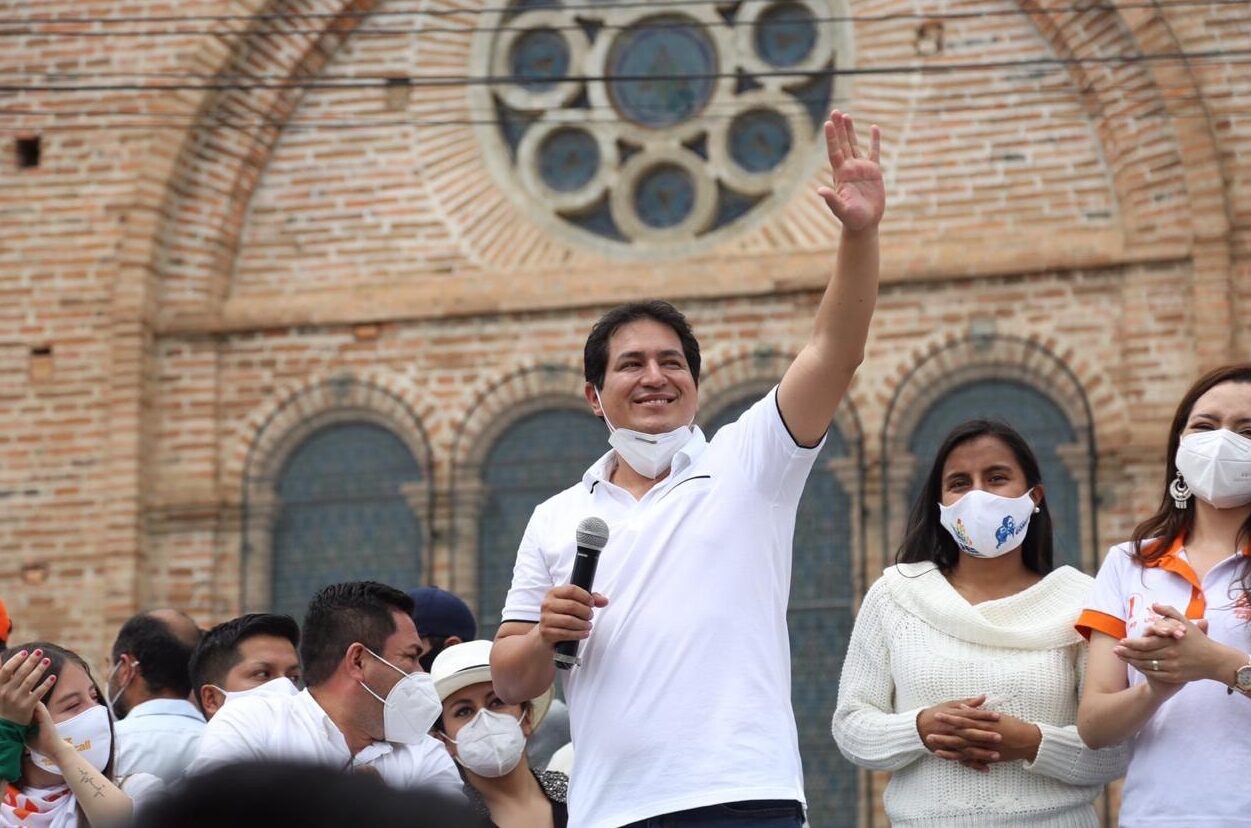Click here for our full coverage of Ecuador’s presidential race
When former President Rafael Correa named economist Andrés Arauz as his chosen candidate in Ecuador’s upcoming presidential election, even close followers of the country’s politics were caught off-guard.
“I had to look up who Mr. Arauz was,” said Augusto de la Torre, a former governor of Ecuador’s central bank.
“It was a surprise,” echoed Angélica Abad Cisneros, a political analyst and professor at the University of Cuenca. “He’s an unknown candidate.”
Turning 36 the day before the election is held on Feb. 7, Arauz would be Ecuador’s youngest president ever if elected. His quick rise to Correa’s inner circle started with a post as a director at Ecuador’s central bank at just 24, and by 30 he landed a position in Correa’s cabinet as the country’s minister of knowledge and human talent.
“He took on many responsibilities as a young man,” said Simon Cueva, an economist who taught Arauz when he was a master’s student at FLACSO Ecuador. “He is quite intelligent, competent, skilled – and very ideological. He was somebody that was very questioning of economic principles.”
Loyal technocrats have recently helped sidelined populist leaders stage comebacks in countries like Bolivia and Argentina. Could the same happen in Ecuador with Arauz?
According to polls and experts, it’s possible. Correa left office in 2017 with approval ratings over 60%. But in April, he was sentenced to eight years in prison on corruption charges and can’t return to Ecuador from his home in Belgium. Still, Correa’s political movement continues to command a following that equal to about 20% of the Ecuadorian electorate, said Abad.
“They’re a force capable of deciding elections,” she told AQ.
Polls have Arauz vying for frontrunner status with businessman and three-time candidate Guillermo Lasso, though the share of undecided voters suggests the race is wide open.
Some see Arauz as Correa’s second chance at shepherding a loyal successor into office who could rehabilitate his image and ideas. Back in 2017, Correa passed the baton to Lenín Moreno, one his former vice presidents. But Moreno quickly distanced himself from Correa’s leftist economic policies and his government pursued investigations into alleged crimes in Correa’s government.
Arauz, meanwhile, describes the legal troubles that have followed Correa as “political persecution” and says that while he himself would be the president, Correa would be his “main adviser.”
“I think if Arauz is elected, it won’t be him who governs,” said Daniel Baquero, a senior researcher at the Corporation for Development Studies, a think tank in Quito. “It’ll be Correa.”
Others see the young Arauz as an opportunity for a new era in Ecuadorian politics.
“His personal style is much slower and less dramatic than what we’ve seen in recent decades,” said Mariela Méndez Prado, a professor at EPSOL, a university in Guayaquil.
Economists AQ spoke with see Arauz as a faithful potential heir to Correa’s economic agenda.
Before beginning his campaign, Arauz was a Ph.D. student at the Autonomous National University of Mexico, where he studied the international monetary system. Arauz has spoken about what he describes as misaligned priorities of the global economy, which fuel crises like climate change, and, like Correa, has criticized the International Monetary Fund and its recent loans to Ecuador.
If elected, Arauz will have his work cut out for him. Ecuador’s next president will need to find the right combination of policies to generate employment and growth in the context of a pandemic and low oil prices. Economists predict Arauz may pursue the kind of big-state policies that helped Correa reduce poverty and crime but left his successor with growing debts after prices for Ecuador’s commodity exports, particularly oil, fell in the final years of Correa’s government.
Arauz government would likely be a “more classically left” government defined by protectionist policies, said Abad. Méndez, meanwhile, suggests Arauz could pursue a form of flexible Keynesianism.
“He has mentioned putting money into the pockets of Ecuadorians to reactivate consumption,” Méndez told AQ.
Currency meddling?
Arauz, who started a website called the Dollarization Observatory, has been skeptical of Ecuador’s decision to dollarize their economy twenty years ago, calling the policy’s initial implementation “unnecessary” and “unjustified.” But despite such statements, he’s promised to defend and strengthen dollarization if he’s elected, stressing what he describes as an urgent need to prevent capital flight and repatriate funds stashed by Ecuadorians outside the country. Dollarization is popular with Ecuadorians, who credit it with bringing stability to the economy, and “no president in his right mind would try to change the currency,” said Méndez, who also writes for the Dollarization Observatory.
“I don’t think he would try to dedollarize the economy if he wins, but I think his policies, taking into account what Correa did, could undermine the system’s stability,” said Baquero, raising questions about Arauz’s respect for central bank independence. Arauz has called such arguments false in a blog post in which he describes prevailing notions of central bank independence as “outdated” and “foolish.”
The race to the presidency is still in its early stages, and the candidates’ plans are likely to come into greater focus. For whoever wins next year, engineering an economic recovery will not be easy. With Chinese lending less available and no commodities boom to benefit from, the international environment is likely to be less accommodating than it was in the boom years of Correa’s government. Today, the country’s fiscal deficit is equal to 8.9% of GDP, according to the IMF, which expects Ecuador’s government debt-to-GDP ratio to increase 17% in 2020.
“Regardless of who the government is, there’s the challenge of how in the world are you going to bring down the deficit over the next three or four years,” De La Torre, the former central bank governor who now teaches at Columbia University, told AQ. “No matter what you do, it will be unpopular.”






